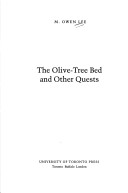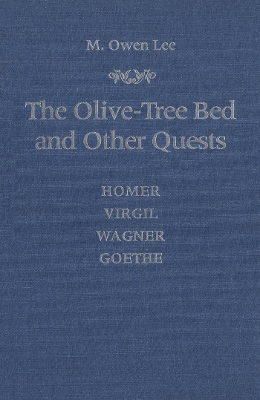Robson Classical Lectures
2 total works
v. 4
In The Olive-Tree Bed and Other Quests, the fourth in the series of Robson Lectures published by the University of Toronto Press, Father Lee studies the quest myth as it occurs in Homer's Odyssey, Virgil's Aeneid, Wagner's Parsifal and Goethe's Faust. Though the four works represent four different genres - oral epic, written epic, music drama, and poetic drama - each deals with the finding of an elusive goal attainable only by the hero called to find it. The questing for the olive-tree bed, the Golden Bough, the Holy Grail, and the Eternal Feminine is, at the deepest level, the hero's search to find the meaning in his life. Though Father Lee's lectures address critical problems in the four works, and draw to some extent on Jungian insights, this volume is also a personal memoir written in the belletristic style for which its author has become known. Father Lee wears his learning lightly, and his writing changes from chapter to chapter as it reflects, in turn, the clarity and na?ve sense of wonder in Homer, the darkness and ambivalence in Virgil, the intuitive mysticism of Wagner, and the riotously imaginative exuberance of Goethe. Each of the four quests comes eventually to be seen as every person's search to discover himself - for the journey of the hero is the myth each of us is called to live.
v. 4
"The Olive-Tree Bed and Other Quests", the Fourth in the series of Robson Lectures published by the University of Toronto Press, is Owen Lee's study of the quest myth as it occurs in Homer's Odyssey, Virgil's Aeneid, Wagner's Parsifal and Goethe's Faust. Though the four works represent four different genres -- oral epic, written epic, music drama, and poetic drama -- each deals with the finding of an elusive goal attainable only by the hero called to find it. The questing for the olive-tree bed, the Golden Bough, the Holy Grail, and the Eternal Feminine is, at the deepest level, the hero's search to find the meaning in his life. Though Father Lee's lectures address critical problems in the four works, and draw to some extent on Jungian insights, this volume is also a personal memoir written in the belletristic style for which its author has become known. Father Lee wears his learning lightly, and his writing changes from chapter to chapter as it reflects, in turn, the clarity and naive sense of wonder in Homer, the darkness and ambivalence in Virgil, the intuitive mysticism of Wagner, and the riotously imaginative exuberance of Goethe. Each of the four quests comes eventually to be seen as every person's search to discover himself -- for the journey of the hero is the myth each of us is called to live.

